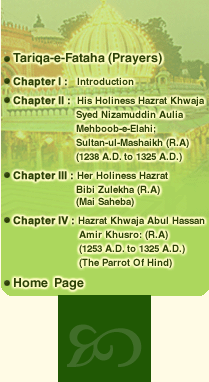"Love
is not like a cup of wine, given to the indiscreet.
Tears are not like rubies gifted to worthless one."
|

| |
HAZRAT KHWAJA ABUL HASSAN
AMIR KHUSRO: (R.A)
(1253 A.D. to 1325 A.D.) (The Parrot of Hind)
|
 |
(3) Path
of Sufism
He was the man of courage and strength
and spoke before the King about the value of equality
of all human beings. In a verse, he observes:
"Though my value may be a little
less, than that of yours, yet, if your veins were to
be cut open, our blood will be of the same colour."
His different reflection of the same
thought written in a prose is as under:
"Oh, Brahmin, can’t you take me into
your fold, this one who rejected by Islam for no other
fault but for his worship of the idol (beloved) or is
it so that for a person like me who is misled. There
is no access even to the presence of that idol."
Amir Khusro was free from prejudice,
bigotry and fanaticism. He loved people of every religion
and every country and was sympathetic towards all the
creations of God. This was the common attitude amongst
the Sufis who preached toleration in religious affairs
and loved mankind. Love of God is identical with the
lover of humanity. A love of God, according to the Sufi
is that, one who loves all the creations of God and
loves all human beings irrespective of caste, creed
and religion.
He says, "men of insight know
that man is blind and undoubtedly blind. He calls himself
a lover but does not regard a Negro worth his love or
devotion…….
Love is deep rooted in human
nature and inclination towards another soul. Love in
fact beautifies the soul and beauty of the soul resides
in the love of humanity!"
Love, the Sufis believe is greater
than religion, "love is the essence of all creeds."
No religion is more sublime than the religion of love
and longing for God. Every worshipper worships God out
of love, love enslaves him. The true mystic welcomes
love in any disguise. One who has a perfect insight
beholds God in every thing, though one worships Him
through some medium.
 —Hazrat
Amir Khusro. —Hazrat
Amir Khusro.
|
|
 |
|
 |
 |





